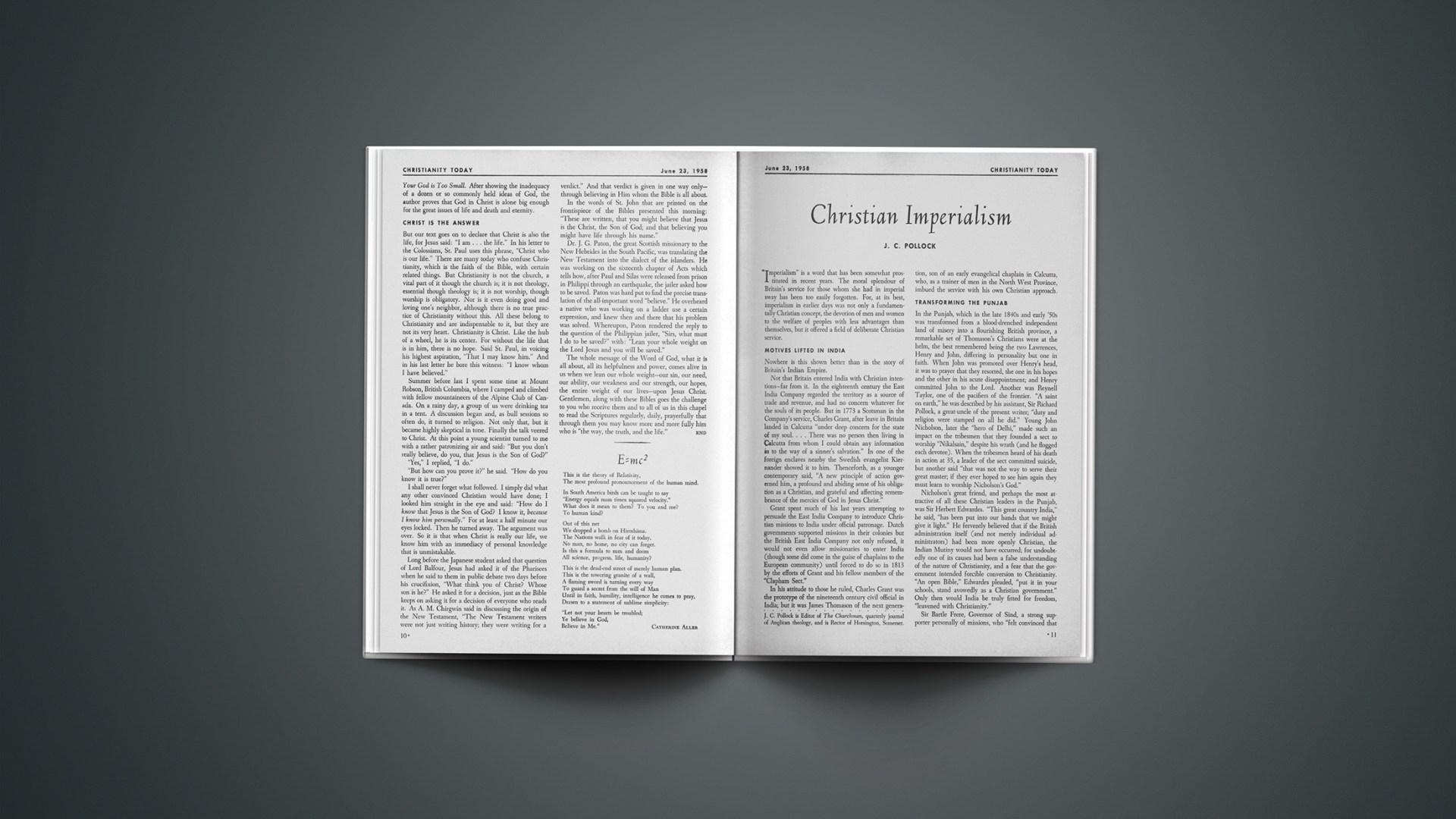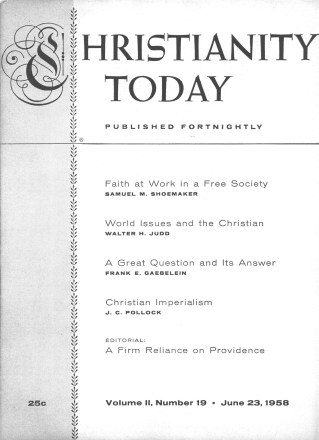“Imperialism” is a word that has been somewhat prostituted in recent years. The moral splendour of Britain’s service for those whom she had in imperial sway has been too easily forgotten. For, at its best, imperialism in earlier days was not only a fundamentally Christian concept, the devotion of men and women to the welfare of peoples with less advantages than themselves, but it offered a field of deliberate Christian service.
Motives Lifted In India
Nowhere is this shown better than in the story of Britain’s Indian Empire.
Not that Britain entered India with Christian intentions—far from it. In the eighteenth century the East India Company regarded the territory as a source of trade and revenue, and had no concern whatever for the souls of its people. But in 1773 a Scotsman in the Company’s service, Charles Grant, after leave in Britain landed in Calcutta “under deep concern for the state of my soul.… There was no person then living in Calcutta from whom I could obtain any information as to the way of a sinner’s salvation.” In one of the foreign enclaves nearby the Swedish evangelist Kiernander showed it to him. Thenceforth, as a younger contemporary said, “A new principle of action governed him, a profound and abiding sense of his obligation as a Christian, and grateful and affecting remembrance of the mercies of God in Jesus Christ.”
Grant spent much of his last years attempting to persuade the East India Company to introduce Christian missions to India under official patronage. Dutch governments supported missions in their colonies but the British East India Company not only refused, it would not even allow missionaries to enter India (though some did come in the guise of chaplains to the European community) until forced to do so in 1813 by the efforts of Grant and his fellow members of the “Clapham Sect.”
In his attitude to those he ruled, Charles Grant was the prototype of the nineteenth century civil official in India; but it was James Thomason of the next generation, son of an early evangelical chaplain in Calcutta, who, as a trainer of men in the North West Province, imbued the service with his own Christian approach.
Transforming The Punjab
In the Punjab, which in the late 1840s and early ’50s was transformed from a blood-drenched independent land of misery into a flourishing British province, a remarkable set of Thomason’s Christians were at the helm, the best remembered being the two Lawrences, Henry and John, differing in personality but one in faith. When John was promoted over Henry’s head, it was to prayer that they resorted, the one in his hopes and the other in his acute disappointment; and Henry committed John to the Lord. Another was Reynell Taylor, one of the pacifiers of the frontier. “A saint on earth,” he was described by his assistant, Sir Richard Pollock, a great-uncle of the present writer; “duty and religion were stamped on all he did.” Young John Nicholson, later the “hero of Delhi,” made such an impact on the tribesmen that they founded a sect to worship “Nikalsain,” despite his wrath (and he flogged each devotee). When the tribesmen heard of his death in action at 35, a leader of the sect committed suicide, but another said “that was not the way to serve their great master; if they ever hoped to see him again they must learn to worship Nicholson’s God.”
Nicholson’s great friend, and perhaps the most attractive of all these Christian leaders in the Punjab, was Sir Herbert Edwardes. “This great country India,” he said, “has been put into our hands that we might give it light.” He fervently believed that if the British administration itself (and not merely individual administrators) had been more openly Christian, the Indian Mutiny would not have occurred; for undoubtedly one of its causes had been a false understanding of the nature of Christianity, and a fear that the government intended forcible conversion to Christianity. “An open Bible,” Edwardes pleaded, “put it in your schools, stand avowedly as a Christian government.” Only then would India be truly fitted for freedom, “leavened with Christianity.”
Sir Bartle Frere, Governor of Sind, a strong supporter personally of missions, who “felt convinced that the conversion of the natives to Christianity was the greatest blessing our rulers could confer on them,” differed from Edwardes in deprecating the teaching of the Bible in state schools except to such as freely asked for it. He believed that to link in any way mission work with government would be disastrous.
Should Christianity Be Imposed?
These opposing views show up the greatest problem in the matter of Christian imperialism. As may be seen in the Philippines or (on a smaller scale) in Goa, the Spanish and Portuguese imposed their form of Christianity on those they ruled. Should the British have attempted to have done so in India? What would have been the result? In New Delhi not long ago I discussed this point with Prime Minister Nehru. He was emphatic that such a policy would have bred the strongest resistance from Hindus and Mohammedans and would have made government impossible. But it was not the Protestant way to cast a thin veneer of Christianity over peoples still at heart non-Christian. Protestant nations could not approach these races as the sixteenth century Jesuit Ricci approached China. It had been Ricci’s belief that if only he could convert the Emperor and persuade him to sign the appropriate decree, four hundred million people would thereby enter the Roman Catholic fold.
The most that the British official could do was to give his personal encouragement to missions; as in the example of Edwardes who presided at the launching of the frontier mission at Peshawar, or Sir Robert Montgomery (grandfather of the World War II leader) who took steps to install the Church Missionary Society at Lucknow in 1858 almost before the dust had settled from the siege, or Sir William Muir, who founded the North India Tract Society, and after retirement was a missionary treasurer.
Officials could and did support the social ameliorations brought about by missionaries, and Christianity in some sense did creep onto the Indian statute book—as in the example of its concept of the sacredness of life (widow-burning and infanticide being abolished), the freedom of the individual conscience (stoning or mutilation of converts from Islam being forbidden), and the equality of sexes (Hindu widows being permitted to marry, the zenanas opened). Despite these efforts, however, many of the reforming laws did long remain dead letters.
Administrator A Civil Father
Above all else such men served Christ by impregnating the civil service with the attitude that the administrator, at each level, was to be father of his people. So many British Christians made Indian government their life work that it became one of the noblest professions, in which Christian values normally were upheld even by those who lacked personal faith.
As the nineteenth century gave way to the twentieth the number of strong Christians in civil services decreased, though there were always some right down to the end of 1947; but the British in India were by this time reflecting the British at home where the climate of secular reaction was taking its toll. In Britain the post-Victorian generation, which maintained Christian values while rejecting individual commitment, failed to solve the national and international problems of its age, and thus bequeathed to its successors a morally chaotic world. So in India—the British could not find a way whereby independence, towards which the imperial government had long worked, would keep the sub-continent undivided, its races and religions living together in the harmony which characterized the British power at its zenith. Whether a way would have been found had there remained many vigorously spiritual men in the administration, and the Christian theory of government had still been matched by the faith of its leaders, is one of the “ifs” of history.
Could India have become Christian while under the British? “If India were converted the gain would be cheaply purchased by the loss of our Empire in India,” wrote a mid-nineteenth century governor. The Empire is now handed over (not lost); yet whereas the religions of India in early British days were moribund, they are now vigorous, and the national churches a small minority.
Flaws In Christian Approach
Part of the trouble developed from the naive view of many distinguished missionaries and men of affairs that India could be won to Christ by education. Vast numbers of Indians, men and later women, passed through Christian schools; but both to them and to their teachers education implied Western education, and thus imperceptibly the religious faith became identified with Western civilization. When Indian nationalism emerged, it revived Hinduism and the other religions as expression of the national spirit, while forgetting (as Prime Minister Nehru does not forget today) that Christianity is itself one of the ancient religions of India with an unbroken history on the Malabar coast from at least the fourth century. But once Christianity was identified with the West, its progress was severely hindered.
More tragic, however, was the failure of so many “Christian” British, especially in the military services, to commend their faith by their lives. “Let us set our own house in order,” said Sir Bartle Frere in 1859, “and remove the reproach cast against us by all native opponents: ‘You spend thousands of pounds to convert one low caste Hindu, but you do not move a finger to prevent your sailors and soldiers from being examples of the grossest vices in every bazaar they frequent.’ ” As the century wore on much improvement could be noted, but never up to the end were the military or business communities, as a whole, positive advertisements for Christ.
In the memory of this particular failure, even more than in the record of the Christian intentions and attitude of the administrators, lies the practical lesson for today, not only for the British but for all the English-speaking peoples. Empires have gone, but business and travel have increased. All over the East there are thousands of men and women of Western countries at work or passing through, whose religion is listed as Christian. It is they who can commend Him whose name they bear. They, sometimes more than the missionaries, can declare Christ to be Lord of all the earth by showing him to be Lord of their lives, and by active support of local Christian effort.
The British had high claim to be called Christian imperialists, but we failed because of our spiritual recession at home to fulfill the dreams of the Christian administrators of a hundred years ago. In the different circumstances of today all Christian nations have renewed opportunity to manifest His name to those who know not Christ as Saviour nor worship him as King.
J. C. Pollock is Editor of The Churchman, quarterly journal of Anglican theology, and is Rector of Horsington, Somerset.










